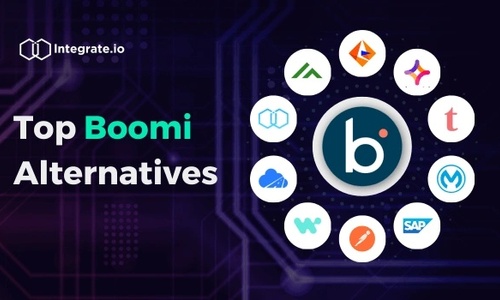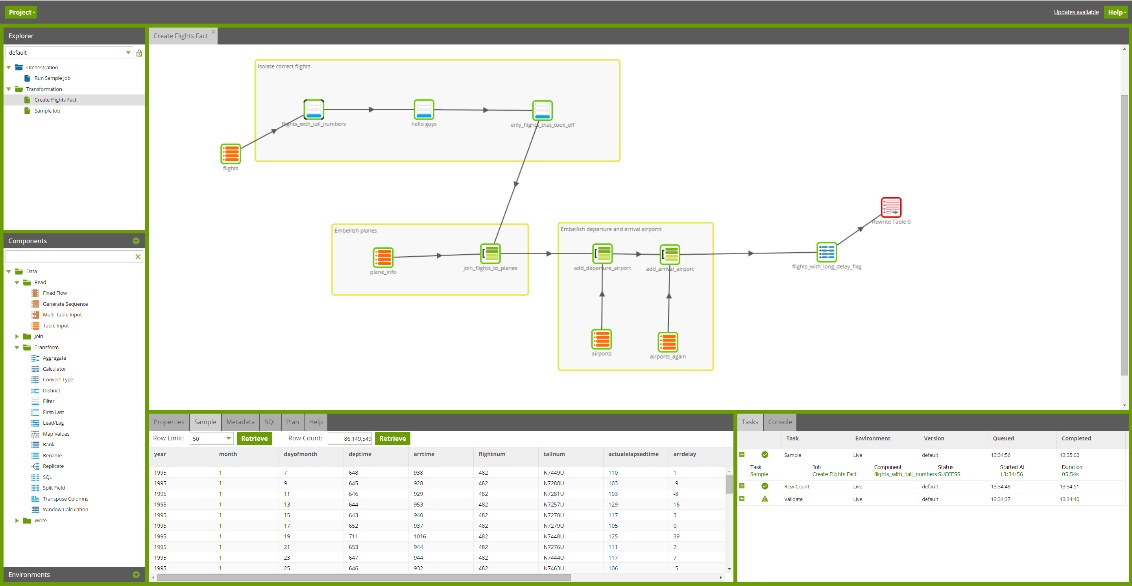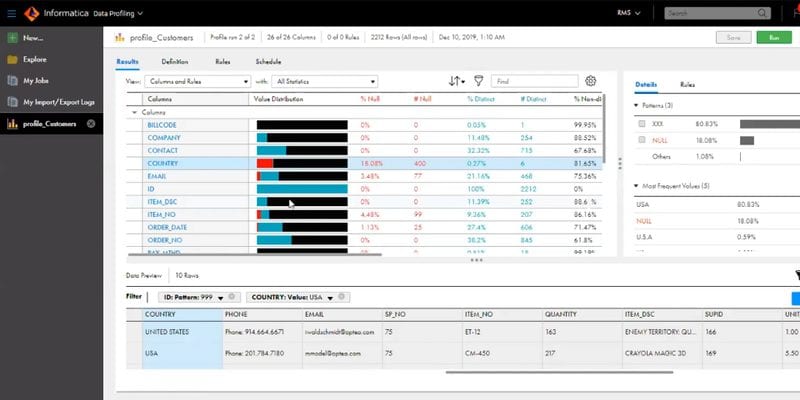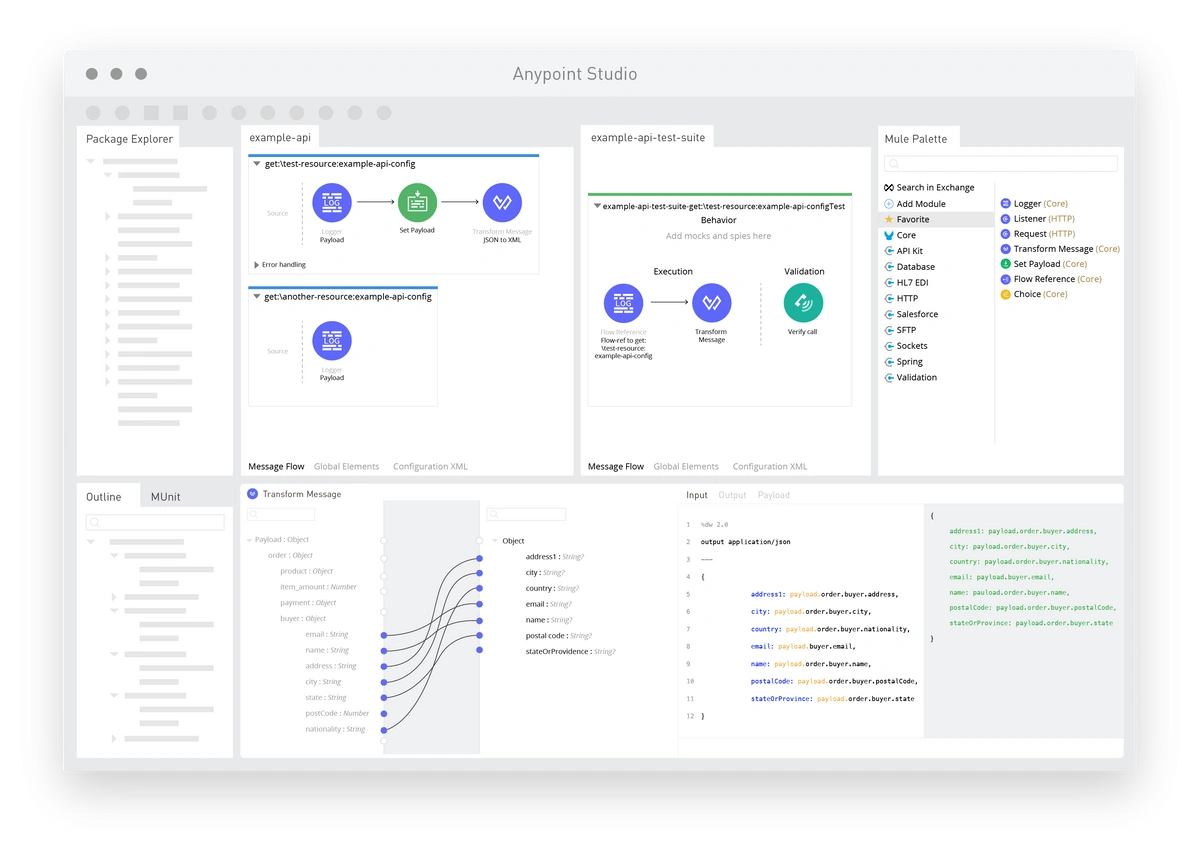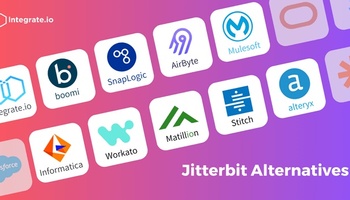Boomi is an integration platform as a service (iPaaS) solution that enterprise-level organizations often select for its robust data monitoring, orchestration, and transformation features. However, there are other areas in which Boomi falls short when compared to its competitors, especially for small businesses or mid-market organizations that want a different approach.
Here’s what you need to consider when looking for a Boomi alternative:
- Boomi is primarily designed for enterprise-level iPaaS requirements; smaller businesses should consider an SMB- or mid-market-friendly solution instead.
- Certain Boomi alternatives specialize in supporting the data integration needs of particular industries, such as healthcare, finance, and insurance.
- If your team is not particularly technical, look for low-code/no-code solutions like Integrate.io with strong customer support resources and reviews.
- Prospective buyers from highly regulated industries should contact vendors to find out what built-in security, governance, and compliance features are included in their platform.
- Some of the top Boomi alternatives include Integrate.io, Matillion, Informatica, Jitterbit, Talend Data Fabric, MuleSoft Anypoint, SAP Integration Suite, Postman, Workato, and Skyvia.
In this guide, we'll cover Dell Boomi alternatives in detail and discuss how they compare to the platform.
What Is Boomi?
Rating: 4.3/5 (G2)
Boomi is widely considered one of the best enterprise iPaaS solutions. Its integration and automation solutions all directly contribute to more complex digital transformation projects, including legacy software and network modernization initiatives.
It's also a strong solution for data integration projects across B2B partnerships, as it simplifies third-party access through APIs without compromising its enterprise-level data security and compliance standards.
Key Features of Boomi
- Intelligent application integration and workflow automation
- Data discovery and synchronization
- A large library of pre-built integrations
- Low-code interface with customizable workflows
- Autonomous performance capabilities with multitenant architecture
- API, B2B, and EDI management
- Master data hub
- Event streams
- Data cataloging and preparation
- Predefined accelerators and recipes
Pros & Cons of Using Boomi
Pros:
- Enterprise-level capabilities, integrations, and automations are available; more than half of Boomi's customers operate at an enterprise level.
- Supports specialized data integration and transformation use cases, including M&A and infrastructure modernization.
- Compatible with various types of computing infrastructure, including cloud, hybrid, and legacy on-premises ecosystems.
- Considered an early founder of iPaaS and operates with one of the largest customer and professional services networks among iPaaS providers.
Cons:
- Features may be too complex for small business and mid-market requirements; marketing and sales integrations are also limited.
- For some users, Boomi is particularly difficult to set up initially.
- Compared to some of its competitors, Boomi is not as highly rated for customer support.
- Monitoring and observability capabilities are somewhat limited for the size and scale of the Boomi platform.
10 Top Boomi Alternatives
The following Boomi alternatives offer a wide range of features and functionalities to accommodate the business needs of organizations from different industry backgrounds and with different sizes and operational use cases.
1. Integrate.io
Rating: 4.3/5 (G2)
Key Features:
- A low-code/no-code interface for ETL and reverse ETL
- CDC, ELT, and data observability
- Hundreds of data connectors are available for various business tools, including sales and marketing platforms
- API generation
- Tailored onboarding experience and 24/7 customer support availability
Integrate.io is a data integration platform that offers solutions for businesses of all sizes but has a particularly strong niche in the mid-market.
Compared to Boomi, Integrate.io particularly excels in offering highly rated and diverse customer support resources, data integration features that meet the needs of marketing and sales professionals, strong API management capabilities, and an intuitive and modern user interface.
Integrate.io offers several different products that are priced individually; interested users should consider which tools make the most sense for their business requirements and budget. Integrate.io pricing is tailored exactly to each client's needs and requirements with a usage-based component couple with features and functionality. Clients choose which level of platform usage they will require and then which features and functionality to create a custom plan to fit their use case.
2. Matillion
Rating: 4.5/5 (G2)
Key Features:
- Extensive list of pre-built connectors and custom connectors with no-code REST API
- Change data capture
- Batch loading for automated data pipeline builds
- Hybrid-SaaS deployment architectures are available
- Stateless microservice agents
Matillion is an easy-to-use and set-up iPaaS solution for the mid-market. It offers a Productivity Platform for Data Teams with several low-code/no-code features. It's another iPaaS solution that primarily focuses on mid-market buyers and their needs, providing excellent scalability features at reasonable price points.
Subscription packages are available at three different price points, with the Basic plan starting at $2.00 per credit used.
3. Informatica
Rating: 4.2/5 (G2)
Key Features:
- CLAIRE engine for diverse cloud-native support options
- Cloud data and application integration
- AI for API lifecycle management
- Cloud and on-premises data quality monitoring
- Cloud B2B gateway for partner onboarding
Informatica's Intelligent Data Management Cloud is another enterprise-level iPaaS solution, but it's one that also caters to the needs of mid-market and small-business organizations. Compared to many of its competitors, Informatica is particularly advanced in AI-powered data management solutions and also pays close attention to ethical issues like ESG and sustainability.
Specific pricing information is not detailed on the Informatica website, though users should expect to pay based on the Informatica Processing Unit (IPU) pricing structure.
4. Jitterbit
Rating: 4.6/5 (G2)
Key Features:
- Cloud Studio for low-code workflow automation and creation
- API creation and lifecycle management
- Centralized management console
- More than 400 pre-built process templates, connectors, and recipes for integrations
- Built-in iterative application development
Jitterbit's Harmony iPaaS is an iPaaS solution that particularly excels in the areas of API management and strong administrative controls. With its comprehensive and easy-to-read management console, as well as its commitment to GDPR, ISO 27001, SOC1, SOC 2, and HIPAA compliance, users in highly regulated industries can feel confident about the integrity of the data integrations they set up.
Pricing is divided into three plans: Standard, Professional, and Enterprise. Prospective buyers will need to contact the Jitterbit team for more specific pricing quotes.
5. Talend Data Fabric
Rating: 4.4/5 (G2)
Key Features:
- Data integration, collection, transformation, and mapping features
- Data quality management with Talend Trust Score
- Automated data cleaning and profiling
- Application and API integration
- Self-service data documentation and classification
Talend Data Fabric is Talend's unified iPaaS solution that combines the best of its modular data governance, integration, and integrity solutions for higher-quality data that meets regulatory compliance requirements.
Customers generally seem excited about the growth and scalability potential of this tool and come from a variety of industrial backgrounds. Pricing information for Data Fabric is only available upon request.
6. MuleSoft Anypoint
Rating: 4.5/5 (G2)
Key Features:
- Anypoint Flex Gateway for more flexible deployment options
- 99.99% uptime with CloudHub managed infrastructure
- On-premises deployment capabilities through Anypoint Runtime Fabric
- Policies with format-preserving tokenization
- API monitoring, management, diagnostics, troubleshooting, and creation
MuleSoft Anypoint is an iPaaS platform from Salesforce that focuses heavily on giving users full control over API creation and management tasks. The platform includes many sub-tools, including Anypoint Runtime Fabric, which makes it possible for users to maintain integrations and overall performance in both on-premises and hybrid ecosystems.
Anypoint is priced through three packages—Gold, Platinum, and Titanium—though specific pricing information is only available upon request.
7. SAP Integration Suite
Rating: 4.3/5 (G2)
Key Features:
- Pre-built and regularly updated integrations
- API management, design, and publishing tools
- AI assistance for development and integration optimization
- B2B partner onboarding and integration support
- Event-driven architecture with detailed customer analytics and views
SAP Integration Suite is an enterprise-level iPaaS solution that scales business process management with easy-to-use integrations and APIs, as well as helpful visuals and documented best practices.
This solution offers specialized guidance for unique business use cases, such as e-commerce and inventory management. As for integration, SAP Integration Suite offers supply chain integrations and other industry-specific integrations that may not be supported by most iPaaS vendors.
This product is priced through two primary plans. The Standard plan starts at $4,273 per tenant/month, while the Premium plan's pricing is available upon request.
8. Postman
Rating: 4.6/5 (G2)
Key Features:
- API tools for testing, documentation, and mockups
- Centralized API repository
- API governance rules
- Collaborative workspaces
- Native integrations, as well as API-driven and open-source integration capabilities
Postman is an API platform that developers from different industrial backgrounds and business sizes use to create, store, and implement APIs. While Postman may not have the same extensive capabilities as traditional iPaaS platforms, its collection of APIs, developer tools, and data governance resources still makes it a strong option for cloud data integration projects.
For access to the Postman AI Platform, users can choose between the Basic, Professional, and Enterprise plans. Basic starts at $14 per user/month, billed annually, or $19 per user billed monthly.
9. Workato
Rating: 4.7/5 (G2)
Key Features:
- More than 400,000 integration recipes
- Embedded AI and integrations
- Large network of system integrators and technology partners
- Workflow automation through low-code/no-code triggers and actions
- Intelligent bots and forms for data collection
Workato is an iPaaS solution with a far-reaching customer base and robust features that cater to the needs of mid-market and enterprise organizations. It's often praised for the ease of use its low-code/no-code interface provides, and much like Integrate.io, Workato is viewed favorably for its customer support resources and availability.
Workato does not transparently discuss its specific prices, but it does explain that users must purchase a baseline workspace and individual bundled recipes on top of that workspace.
10. Skyvia
Rating: 4.8/5 (G2)
Key Features:
- Batch integration for legacy and new data
- Low-code/no-code configurations
- Data import and export with simple ETL and data replication with ELT
- Bi-directional data synchronization
- Control Flow designer for integration process orchestration
Skyvia is one of the few truly SMB-friendly iPaaS solutions on the market today, even offering a free plan for organizations that only have small data volumes to integrate. Its entire interface takes a low-code/no-code approach and guides users through complex processes like data pipelining and process orchestration.
For Skyvia's Data Integration solution, pricing is divided into five plans: Free, Basic, Standard, Professional, and Enterprise. The Free plan gives users access to 10,000 records per month and two scheduled integrations.
Simplify Data Integration With Integrate.io
Integrate.io is a particularly strong competitor to consider if Boomi isn't for you. Integrate.io takes special care to provide small business and mid-market users with catered customer support, a clean and user-friendly interface, and straightforward connectors that make the most sense for their business requirements.
Compared to other Dell Boomi competitors, Integrate.io pays close attention to the user experience, not letting robust features get in the way of usability and accessibility. If you're interested in giving Integrate.io a try for your cloud integration needs, book a demo today!
FAQs
What Is an Integration Platform as a Service (iPaaS) Platform?
iPaaS is a cloud-based integration platform and set of services designed to support application modernization, transformation, and integration across different formats, processes, and computing environments.
What Are the Benefits of iPaaS?
The benefits of iPaaS are as follows:
- Access to a central monitoring and management console for data integrations, APIs, and transformations
- Ability to operate in hybrid environments without compromising connectivity goals
- Ability to scale existing integrations without compromising current data quality or performance
What Are iPaaS Platforms Used For?
iPaaS platforms are used to standardize, modernize, and otherwise prepare applications, data, and workloads in such a way that integrations can be set up more smoothly between different cloud, multi-cloud, hybrid, and on-premises environments.
